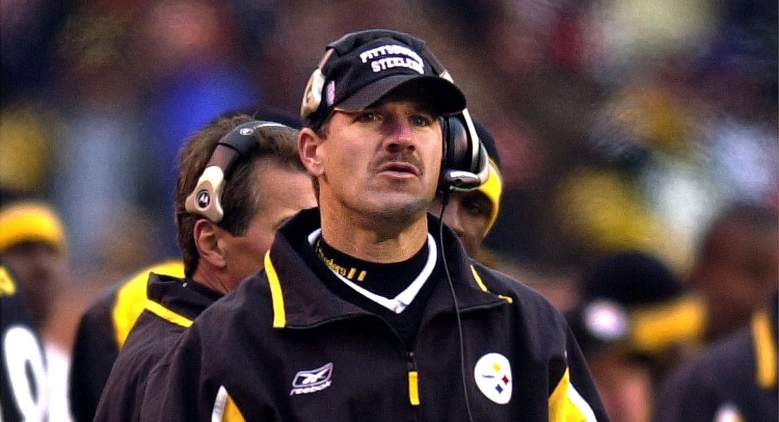
Getty Pittsburgh Steelers' head coach Bill Cowher watches from the sidelines during the overtime period on 11 November, 2001, at Cleveland Browns Stadium in Cleveland. Pittsburgh defeated Cleveland 15-12 in overtime.
Bill Cowher was holed up in his office watching game tape just like every other Tuesday since he became a head coach.
Only this day wasn’t like every other Tuesday.
Russ Grimm, the Pittsburgh Steelers offensive line coach, walked into Cowher’s office with a look of concern.
“I had just got off the phone with Marty Schottenheimer, who was coaching the Washington Redskins at the time,” Cowher recalled on TribLive’s recent Breakfast with Benz podcast. “I was looking at tape, and Russ Grimm came walking in and said, ‘Coach, have you checked the news? Put on the news. There was a plane that just went into one of the Twin Towers in New York City.'”
ALL the latest Steelers news straight to your inbox! Join the Heavy on Steelers newsletter here!
On the dreadful morning of September 11, 2001, the U.S. was attacked by terrorist group al-Qaeda after it had hijacked four planes. Two were flown into the Twin Towers of New York City’s World Trade Center and a third into the Pentagon. Headed for Washington, D.C., the fourth plane crashed into a Pennsylvania field after passengers took the plane over from the hijackers.
Suddenly, the Steelers 21-3 loss to the Jacksonville Jaguars two days prior seemed insignificant.
Initially, Cowher said, there was nothing the team could do but continue practicing and game-planning for their upcoming opponent, the Cleveland Browns. Through the chaos, confusion and uncertainty that were the ensuing hours, the Steelers tried their best to focus on the task at hand.
Decision of a Lifetime
On Wednesday, the day after the terrorist attack, NFL commissioner Paul Tagliabue alerted clubs that the Week 2 lineup of games would be postponed until the rest of the season was completed. This American tragedy that claimed the lives of approximately 3,000 people was so much greater than the game of football.
“It was clear to me that the NFL had come to be a huge symbol of the qualities Americans like to see in themselves – resilience, working through adversity, never giving up,” Tagliabue said in 2001.
“The NFL had to do something. The dominant atmosphere was one of death, devastation, fear and paralysis. Put it all together and the thing to do was recognize the despicable nature of the attacks and the horrible loss of life. You did that by canceling games and getting your priorities straight. And then you came back the next week to show resilience and that we were all standing tall in the face of adversity and carrying on.”
With an early Week 3 bye, the Steelers would not resume play until September 30, 2001.
A Statement Year
The events of 9/11 united the Steelers, and the team produced one of the best seasons of Bill Cowher’s 15-year career.
“We decided that we were going to make a statement,” Cowher said.
And they did.
After three miserable seasons (by Steelers standards, anyway) in which Pittsburgh went 22-26, the team witnessed a comeback year, fueled by unity and the desire to rise above tragedy.
Following the opening loss to the Jaguars, Pittsburgh only dropped two more regular season games — both to the division rival Baltimore Ravens and Cincinnati Bengals. At 13-3, the Steelers won the AFC Central and the divisional playoff round before facing defeat at the hands of Drew Bledsoe and the New England Patriots.
“With what took place that season, I was very proud of our football team and our coaches,” said Cowher.